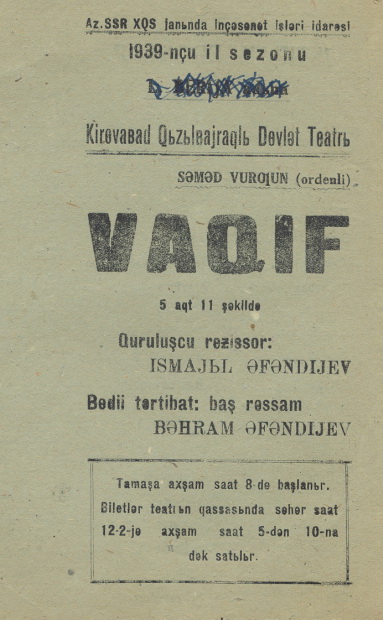59 Azerbaijani (Azeri)

Azerbaijani or Azeri is the term that is used interchangeably for the language throughout the 19th and 20th centuries. It is also known as Azerbaijani Turkish and retains most of the traditional grammatical endings of the pre-Republican era Turkish language that was spoken in the Ottoman Empire. However, in a certain sense, it is also influenced heavily by the Persian vocabulary. The language is currently spoken in the Republic of Azerbaijan that was a part of the Czarist Empire in the 19th century as well as in Southern Azerbaijan that is the part of modern-day Iran. In the Republic of Azerbaijan, the language script was changed several times. Currently the Latin script is used. The Iranian Azerbaijan continues to use Arabo-Persian script.
Samad Vurgun was a well-known Azerbaijani poet and playwright. The first work of Vurgun — the poem “Address to Youth” — was published in 1925 in the Tbilisi newspaper New Thought. Today every Azerbaijani schoolchild is familiar with his poetry. It is often set to music and performed by leading Azerbaijani artists. Featured in this entry is the play Vagif written in 1937 and which pays homage to the 18th-century Azerbaijani poet Molla Panah Vagif.
During his youth, Vurgun lived through the tough years of World War II. This challenging period had a very significant impact on his poetry, which was a real weapon against the enemy in that difficult time. He wrote over 60 poems on the theme of the Great Patriotic War. It was not an easy task, but in his works, the young poet managed to inspire an optimistic mood amongst the people, who were suffering from the hardship of war.
He was calling on people to be patient and hardworking to attain victory. Vurgun’s popularity grew during the propaganda campaign — leaflets with his creation “Ukrainian partisans” were dropped from planes over local forests to maintain the high spirit of the guerrilla fighters.
His poem “Parting Mother” was highly appreciated as the best anti-war work during a contest held in the US in 1943. It was published in New York and distributed to military personnel after it was selected among the best 20 poems of world literature about the war.
During World War II, Vurgun created poems dedicated to the deeds of Azerbaijanis in the fight against fascism. In the poems “Nurse”, “Bearer”, “The story of the old soldier”, “Brave Falcon”, and “Unnamed Hero”, he describes the selfless struggle against the invaders, the heroism of Azerbaijani soldiers and their contribution to the liberation of people from fascism. Due to his patriotism and unique talent, Samad Vurgun became a poet of the nation.
In 1943, Vurgun was awarded the title of Honorary Artist of Azerbaijan SSR. Two years later he was elected to the Azerbaijan National Academy of Sciences. His works have been translated into many foreign languages. For many years, he headed the Azerbaijan Union of Writers, was repeatedly elected a deputy of the Supreme Soviet of the USSR and Azerbaijan and was awarded many orders and medals. His early lyric poems were published only after his death, in a compilation called “Chichek” (“Flower”).
Living in the era of a communist dictatorship, Vurgun had to praise the regime in his works, but in spite of this, the creativity of Vurgun, the restrained style of his poems had a tremendous impact on the development of the Azerbaijani poetry. Samad Vurgun died in May of 1956 and is buried in the Alley of the Heroes in Baku.
The Azerbaijani Studies collections in the UC Berkeley Library represent the current research interests of our faculty and students. One of the well-known scholars of Caucasus Studies, Professor Stephan H. Astourian, interrogates the historical realities of Caucasus, Armenia, and Azerbaijan in the context of the Armenian Genocide. The Azerbaijani collections are also supported through the donations of books by the Azerbaijan Cultural Society of Northern California. One prominent mathematics professor of Azerbaijani descent was Lotfi A. Zadeh. The focus of current collections on Azerbaijan revolves around the history of Azerbaijan and Caucasus, Armenian Genocide and the Frozen conflict of Artsakh/Nagorno-Karabakh.
Contribution by Liladhar Pendse
Librarian for East European and Central Asian Studies, Doe Library
Source consulted:
Gadimova, Nazrin. “Samad Vurgun: A Poet With Pen as Sharp as Weapon,”AzerNews (May 28, 2013), (accessed 5/1/20)
Title in English:
Author: Vurghun, Sămăd, 1906-1956.
Imprint: Bakı : “Şərq-Qərb”, 2005.
Edition: n/a
Language: Azerbaijani (Azeri)
Language Family: Turkic
Source: Sabunchu District Central Library, Central Libraries of Azerbaijan
URL: http://sabunchu.cls.az/front/files/libraries/54/books/831431433401352.pdf
Other online editions:
- Vurghun, Sămăd, 1906-1956. Избранные сочинения в двух томах: перевод с азербайджанского. Translated into Russian by Pavel Antokolʹskiĭ. Moskva: Gosizdatel’stvo khud.literatury, 1958.
Select print editions at Berkeley:
- Vagif ; Mughan / Sămăd Vurghun. Baky: Gănjlik, 1973.

